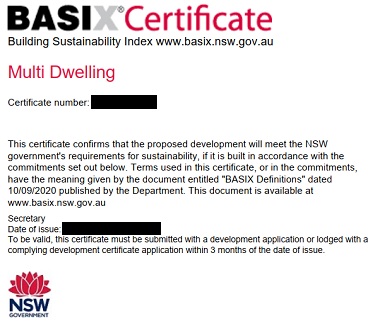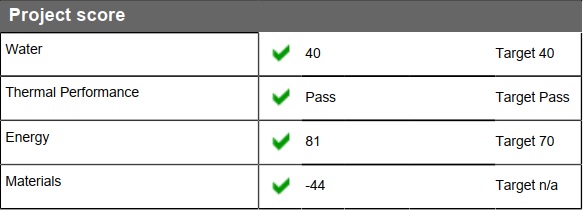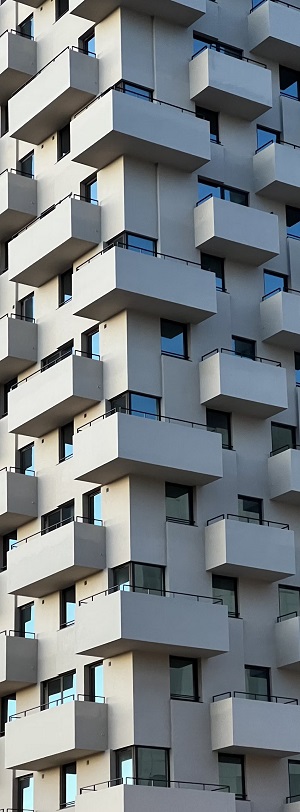What is BASIX?
BASIX stands for Building Sustainability Index and was introduced as a NSW government initiative on 1 July 2004. The purpose of this initiative was to encourage builders to follow sustainable building development in the residential sector. BASIX is a web-based scoring platform that aims to reduce the consumption of water by 40%, reduce greenhouse gas emissions by 45% by 2030, and increase the thermal comfort of occupants in residential dwellings. Find out what you are looking for here:

At Energy Compliance Consultants, we offer effective strategies and obtain a BASIX Certificate for your development in a timely manner.

Quality
Our strategy is to conduct low-cost and effective sustainability measures, suited to your development
Our BASIX reports are council-ready, inclusive, accurate and illustrative.

Quality
Our strategy is to conduct low-cost and effective sustainability measures, suited to your development
Our BASIX reports are council-ready, inclusive, accurate and illustrative.

Service Guarantee
If we can’t deliver on time, we’ll only charge our 40% deposit. This is the best proof of how cost-efficient our performance-based solutions are. You won’t get this anywhere else!

Quick Turnaround
Quotations: Same business day of inquiry.
BASIX reports: 4-10 business days.

Quick Turnaround
Quotations: Same business day of inquiry.
BASIX reports: 4-10 business days.
When do I need a BASIX Certificate?
Before building a residential dwelling or apartment, you will need approval from your local council in NSW. Therefore, you will have to lodge a “Development Application (DA)” with your local council to prove that your development is following the council’s sustainability goals. The following developments require a BASIX certificate:
| New Class 1 buildings | New Class 2 buildings | New Class 4 buildings | Other |
|---|---|---|---|
|
|
A class 4 building is a residential sole occupancy unit contained within a commercial building, e.g. a janitor’s house inside a school |
|
BASIX certificate confirms that your development will meet the NSW requirements for sustainable development if built in accordance with the commitments you have made in the NSW planning portal.
Could my development be exempt from the BASIX requirements?
Yes. If your development falls in the following categories, your development could be exempt from the BASIX requirements:
- Certain types of Class 10 buildings: installing fences, antennas, small sheds and swimming pools, decks, etc.
- Low-cost housing: in some areas in NSW, low-cost housing could be exempt from the BASIX requirements entirely or may qualify for less strict requirements.
- Small alteration projects: alteration projects that cost less than $50,000 are exempt from the BASIX requirements.
- Temporary structures: building of temporary structures that are intended for temporary use may be exempt from the BASIX requirements.
What are the BASIX commitments and sustainability requirements?
The BASIX focuses on 3 main categories: Water, Energy, and Thermal Performance. Each of these categories in the BASIX contains several sustainability criteria to check for your building. Checking and applying these conditions to your building grants you a score in each category, which must be equal to or more than the specified Target. For example, the following feature shows that the building is a subject for DA approval since in all 3 categories, the building achieves the necessary score.

With some exceptions in several councils, the Target for Water category is 40, for Energy is 70 and as for Thermal Performance, the building either passes or fails. The following Table shows proper responses in developing a sustainable building, which is in accordance with the requirements under BASIX:
|
|
|
|---|---|
|
|
|
|
|
|


What is required for a BASIX assessment?
To undertake a BASIX assessment and to minimize the back and forth between the assessor and the client, the following information is required as a minimum to be shown on the drawings:
- Site area
- Landscaping area
- Wall types or wall schedule
- Window schedule, including window types and openable portion
- Roof cladding colour
- Window frame type and colour
- Electrical plan to show the number of ceiling penetrations:
We understand that this may not be achievable at the early design stages, however, to avoid a very conservative default penetration definition in the simulation software, it is best to provide it for the assessor
What do I have to show on DA drawings?
After the BASIX Certificate has been issued, some of the main commitments are instructed to be shown on the Development Application (DA) drawings. These commitments may include:
- Showing the volume of the swimming pool.
- Showing the location of proposed rainwater tanks and catchment areas.
- Showing the location of the heat pump hot water system.
- Showing the location and capacity of the Solar PV system.
- Showing the location and extent of added insulation including R-values to the walls, floors, and roof/ceilings.
- Showing the location of Indigenous and low-water-use plants.
- Showing the bathrooms and kitchens that have access to natural light
- Showing the location of ceiling fans
Feel free to navigate through our past experiences
FAQ
With the old standard of NCC 2019, a 6-star rating dwelling passed the thermal performance requirements; however, the new standard of 2022, requires at least a 7-star rating.
No, BASIX is required solely in NSW, whereas NatHERS Whole of Home assessment is used nationwide. If you are seeking DA approval in NSW, you will need to undertake a BASIX assessment.
- NatHERS whole of home is used nationwide, but BASIX is specific to the residential developments in NSW.
- The term “conditioned space” has different meanings when performing BASIX or NatHERS WoH. The assessor must take discretion in how he/she defines a condition space when performing BASIX or NatHERS WoH.
- BASIX metric for sustainability is reduction in greenhouse gas emissions but the NatHERS WoH metric is Energy Value or Net Cost to Society.
The Do It Yourself (DIY) method is a web-based Deemed-to-Satisfy pathway to achieve the necessary score to pass the Thermal Performance section of BASIX in the NSW Planning Portal. DIY is a straightforward but rigid and strict method by which single dwellings can meet the requirements for the Thermal Performance category.
The simulation method of compliance with the Thermal Performance requirements includes modelling of the proposed building using accredited software by the NatHERS (e.g. FirstRate5). This method of compliance is more flexible than the DIY method and rates buildings with star bands ranging from 0 to 10. Find out more here.
Yes. Some criteria in each category may relate to the outcomes of another category in BASIX. Two examples of such instances would be:
1- Using water-efficient fixtures reduces the demand for hot water and thus, reduces the required energy to heat the water. This grants scores in both categories.
2- Going beyond a 7-star rating means that the building performs very well in reducing the demand for artificial heating and cooling. This means that the required energy for air-conditioning equipment will be reduced also.
No. The Verification Using a Reference Building (VURB) method as described in the NCC is not suitable to be used for developments in NSW. There are two methods of compliance with the Thermal Performance requirements using BASIX that is the DIY method (i.e. Deemed to Satisfy method) and the Simulation method.
Use of the JV3 Verification method for Class 2 buildings (residential multi-unit buildings) is allowed under NCC 2022, but not for buildings in NSW. For new apartments in NSW, the Simulation method (using NatHERS-accredited tools) must be used as a means to achieve compliance with the requirements.
No. The Deemed to Satisfy (DtS) method in the NCC is not suitable for buildings in NSW. There is a specific Deemed to Satisfy approach called the DIY method when undertaking BASIX assessment, which is web-based and is used for single dwellings in NSW.
Yes, if the cost of the alteration/addition project is more than $50,000.
The whole of Part 13 does not apply to buildings in NSW. Only the general requirements of Part 13.2 (Building Fabric), Part 13.4 (Building Sealing), and Part 13.7 (Services) apply in NSW. The rest of the requirements are addressed in BASIX and other regulations.
The whole of Section J does not apply to multi-unit residential buildings in NSW. Only the general requirements of Part J4 (Building Fabric), Part J5 (Building Sealing), Part J6 (Air-conditioning and Ventilation, with the exclusion of J6D10 Space Heating), Part J8 (Heated Water Supply), and Part J9 (Energy monitoring and on-site distributed energy resources) apply in NSW. The rest of the requirements are addressed in BASIX and other regulations.
Yes, all-electric homes can achieve the higher BASIX standard more easily. These homes are ready to become net zero carbon in the future and thus, are preferred by the NSW government.
DIY (Do It Yourself) method of compliance is rigid and strict on following several mandates that in some cases, may be costly to implement. Although the simulation method costs more to undertake, it can easily pay the assessor’s fee back into your pocket in many cases where the cost of insulation and glazing is lower than that mandated under the DIY method.
There are no policy changes regarding water consumption in the new BASIX standard and the previous changes apply [source]. However, BASIX Thermal Performance and Energy standards for new residential buildings have been increased, which is in line with the Net Zero Emission target by 2050.
Yes. The higher BASIX standards will apply to new residential buildings but excludes:
- Dwellings in the North Coast climate zones
- Small multi-unit buildings up to 5 storeys
The BASIX Thermal Performance protocol refers to the NatHERS Technical Note. It also suggests interpreting the requirements in accordance with the NatHERS technical notes [source].
No. Gas appliances are not banned under the new standard, however, an all-electric house could achieve the BASIX goals much easier.
Yes. You can revise your commitments and a fee may apply. However, after obtaining the construction development certificate (CDC), it is not possible to change any of the agreed commitments.
No. After obtaining the construction development certificate (CDC), it is not possible to change any of the agreed commitments. To do so, you will need to obtain a new BASIX Certificate and go through the whole process once more!
It is not banned but admittedly harder to achieve higher BASIX standards (2022 onwards). If you are using a DIY method of compliance, dark roofs are banned in several areas in NSW, like Greater Sydney. However, if you are using simulation instead of the DIY method, then you can have dark roofs anywhere in NSW, but you will have to compensate for the increased cooling demand elsewhere (e.g. by installing tinted windows or shading devices).
Construction materials contain embodied carbon emissions, that is the gases released due to the extraction of raw material to the fabrication of the final product. Because of the revealed complex relationship between the proposed Material standard and the existing thermal performance standard, the standard for embodied emissions from building materials will not apply for further data gathering and assessments. The target for the Material category will likely be available for the next BASIX standard in 2025.

 Water
Water Energy
Energy Thermal Performance
Thermal Performance

